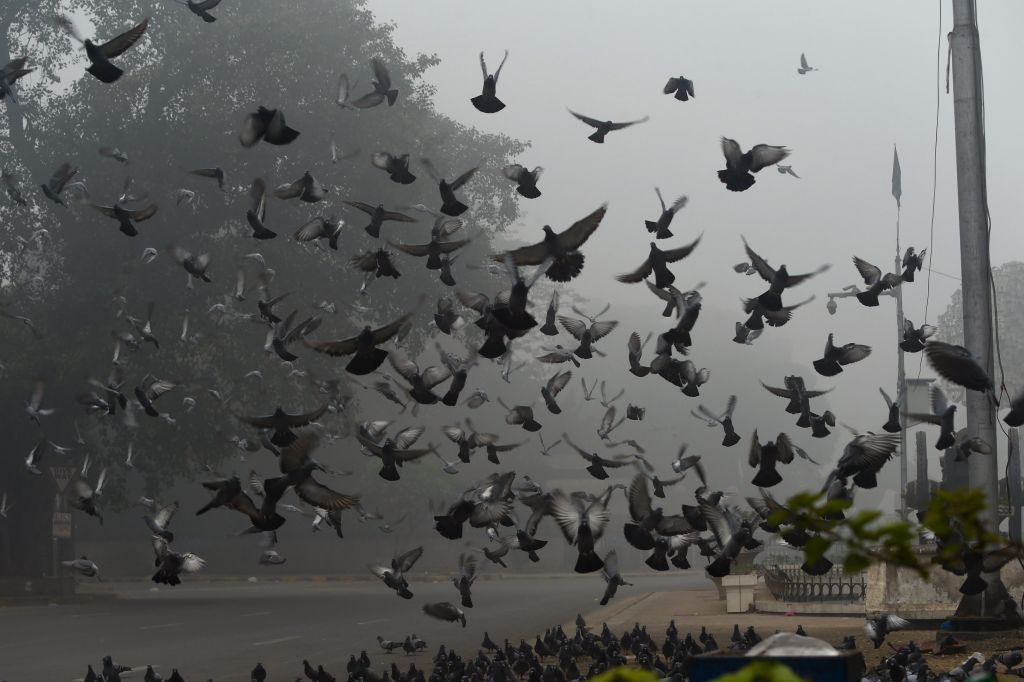My city, Lahore, is disappearing.
There is nothing figurative about that sentence. I genuinely cannot see my hometown outside my window. The skyline is a haze. If I step outside, my eyes will start smarting and that is unlikely to help vision either.
You should be able to see cities. You should not be able to see the air. We seem to have confused the two in Lahore.
Something terrible has indeed happened in the second-largest city of Pakistan. Since the start of November, 10 million people in Lahore have been breathing air that is either “very unhealthy” or “hazardous”. Breathing is a burden; a consequence for decades of uncontrolled emissions, low fuel quality, crop burning and climate change.
Students are faced with the choice of either breathing in toxic air or missing out on school. Hospitals are taking in more children for respiratory illnesses than before. Mask vendors are making a killing.
The government thinks people are overreacting. That some are trying to make a sale of air filters through fearmongering. That when it comes to wanting clean air, we perhaps want too much. Particulate matter, a major component of smog which is the size of about one-twentieth of a human hair, is small enough to ignore, so why won’t we?
About five years ago, reports of the toxic air in various cities in China started pouring in. Images of what looked like a post-apocalyptic Beijing bombarded the internet. I remember staring at the photos, aghast at the notion of needing a mask to simply step outside of your house. Soon, a start-up in Canada began advertising cans of “pure Canadian air.”
When people in China bought them by the dozen, we gawked, not realizing what they were actually facing.
When you’re told to calm down, it starts with a deep breath. For the people of Lahore, that’s not an option.
Rimmel Mohydin
And like most tragedies, we never thought it would happen to us and bottled fresh air sounds like a great idea right about now.
When I moved to Colombo over a year ago, I was told that the tropical city only has three seasons: hot, hotter and hottest. Lahore seemed even more special then. We have all four. And now there’s a bonus one – we call it ‘smog’ season.
That we call it a season is telling. It came with warning; it has happened before and will likely be upon us again next year. Lahoris are known for being great hosts. By calling it a season, we seem to have found a home for smog as well.
A new kind of language fluency is also emerging among those in the know. There are mobile apps that tell us how many cigarettes we have smoked, despite not bringing even one to our lips. We speak in terms of AQI, or Air Quality Index, a unit that measures whether the air is safe to breathe or not. We know the ranges, and the advisory that each carry. We know not to get surgical masks or even N97 ones. It’s the bulky air respirator that does the trick.
Unfortunately, those who need to make use of this language the most remain unaware of it or unable to protect themselves from this risk.
Lahore is a storied city, steeped in history and literature, both a backdrop and muse to many artists. It is also one of major inequalities. If you are a labourer, a farmhand or a construction worker, you will likely be poisoned faster because your work keeps you outside. It is unlikely that you can take a day off to save yourself from the smog, because you count on daily wages. It is a sickening reality that you will hurt in silence.
This is why Amnesty International is resorting to issuing an Urgent Action, saying the health and lives of the people of Lahore are in danger. This is an unprecedented step for a whole city, where everyone is at grave risk of human rights violations. Thousands of letters from all over the world will find their way to those in power. When you can’t see, collective noise can often cut through.
We have spent so much time worrying about other threats –be it conflict or war – that we failed to see this enemy, hiding in plain sight. There is no escaping it. Those of us who are able to afford to can take little steps, like wearing masks and buying air purifiers, to make ourselves feel like we have done enough. The government has also taken little steps – issuing vague statements and appointing committees. At a minimum, it should implement the plan that the Court-appointed Smog Commission already asked them to do.
When you’re told to calm down, it starts with a deep breath. For the people of Lahore, that’s not an option.


